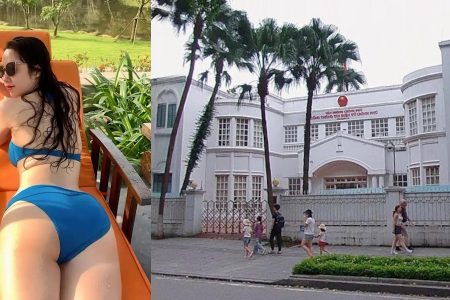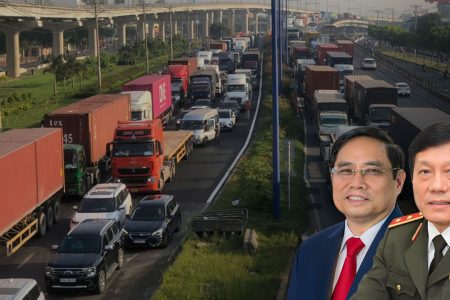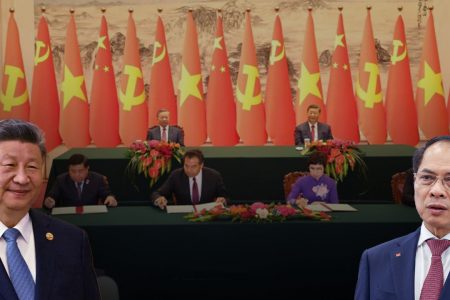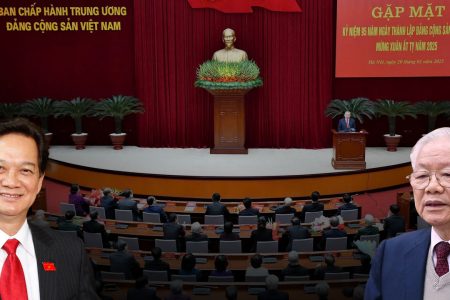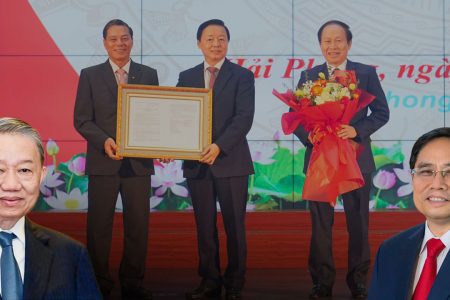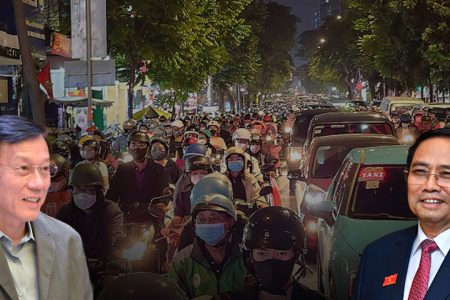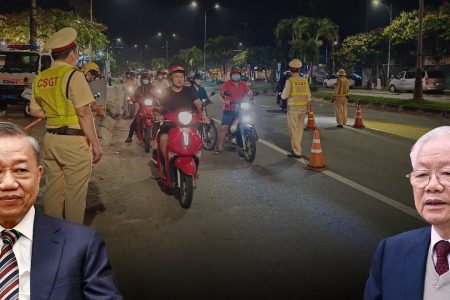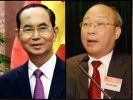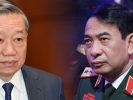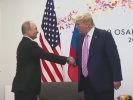
One day after China’s Defense Minister Wei Fenghe had a meeting with Vietnamese General Secretary Nguyen Phu Trong and State President Nguyen Xuan Phuc on March 27, the Chinese media reported that Mr. Phuc affirmed: “would not follow another country to act against China.” The statement is said to have been made by Vietnamese leaders, both domestically and internationally, amid Hanoi’s reactions being closely watched before hundreds of Chinese fishing vessels are present in Whitsun Reef in the Truong Sa (Spratlys) that Vietnam claims.
“Vietnam made positive comments about its relationship with China during the visit of China’s State Commissioner and Defense Minister Wei Fenghe, emphasizing that Vietnam will never follow other countries against China,” the Hoan Cau Thoi Bao newspaper quoted the Xinhua News Agency as saying on April 27.
Meanwhile, the Vietnamese media, when reporting on the meetings, did not mention the above assertion of Vietnamese leaders, but only said that regarding the South China Sea issue in particular, “The State President affirmed that the peaceful environment of the East Sea [South China Sea] is a favorable condition for the two sides’ functional agencies to deal with existing issues, especially maritime issues.”
Vietnam’s People’s Newspaper added that Phuc “wishes the two armies to continue to strengthen their solid strategic confidence-building” while Trong “wants the two Parties to continue to strengthen their strategic trust while the two countries continue to make efforts to preserve a peaceful environment and cooperate on the basis of respecting each other’s legitimate interests.”
While VOA has not received any response from the Vietnamese government about the request to verify the truthfulness of Nguyen Xuan Phuc’s alleged statement, some Vietnamese South China Sea experts have doubts about the former Vietnamese PM’s making a statement that could be detrimental to Vietnam in its struggle for sovereignty with neighboring countries, especially when Mr. Phuc had a period of time running the government during the period of tense upheavals in relations with China and in the South China Sea took place.
“Mr. Nguyen Xuan Phuc never said that sentence,” Ha Hoang Hop, guest senior researcher at the Institute of Southeast Asian Studies (Iseas) of Singapore, confirmed to VOA based on the source he got from those present in the event.
“Vietnam never has a policy that concretizes the relationship with China in such a way,” Ph.D. Hop added.
This is the 6th time that the Minister of National Defense of China has visited Vietnam in the program “Vietnam-China Border Defense Friendship Exchange.” According to Hop, the Vietnamese side has never made such an assertion and is “even more impossible now” as sovereignty tensions in the Whitsun Reef are still growing.
Meanwhile, another South China Sea expert, Master Hoang Viet, a lecturer at Ho Chi Minh City University of Law, said, “The Global Times is an unofficial (Chinese) mouthpiece but always hawkish, especially in the propaganda policy when deliberately saying that Vietnam is not moving in the direction against China.”
“It is true, but it must be added that Vietnam is not against either side, either the US or China,” Master Hoang Viet told VOA.
However, according to him, although the official stance of Vietnam is so, “in fact, the Vietnam-US relationship has many strong and outstanding developments, while the relationship between Vietnam and Vietnam China seems to be decreasing more and more.”
For example, according to Master Hoang Viet, even during the event that the Chinese Defense Minister Wei Fenghe visited Vietnam, only a few official newspapers of the government, the Communist Party or the Vietnamese army reported while the events related to the relationship with the US in the past year have been reported quite vigorously by the Vietnamese media.
“It shows the attitude of the Vietnamese people towards both the US and Chinese authorities,” added expert Hoang Viet.
In the report of Global Times, in addition to putting Mr. Phuc’s alleged statement as the headline, the article also cites the analysis of Chinese experts saying “Hanoi is becoming more mature” while notes that “the US-proposed Indo-Pacific strategy would undermine regional peace, integration, and integration because it uses regional differences to exaggerate and exaggerate escalating tensions, and Hanoi doesn’t want to be taken advantage of.”
Commenting on the above information content, Hop said “Exactly the government and the Chinese Communist Party told them to distort the truth.” According to him, although the two Communist parties of China and Vietnam have the same ideology, they are very different in terms of “politics, organization” and “strategic relationship between the two sides is having a big problem about national sovereignty.”
The Vietnamese expert said that the Chinese media’s intentions in “internal division of Vietnam” on anti-China stance on the issue of sea and island protection were clearly visible and “divide Vietnam with the international community.”
Also during his visit to Vietnam, the Chinese Minister of Defense met with the Vietnamese Minister of National Defense – Senior Lieutenant General Phan Van Giang. The Vietnamese media said the two sides had “frankly exchanged” about the current problems in the bilateral relationship. In particular, Gen. Giang affirmed the consistent point of resolving disagreements through peaceful means in the spirit of respect for each other’s legitimate rights and interests, on the basis of international law, the 1982 United Nations Convention on the Law of the Sea, and the “Declaration on the Conduct of Parties in the South China Sea” (DOC), which does not complicate the situation, does not act of force or threaten the use of force.
Thoibao.de (Translated)



